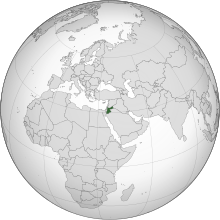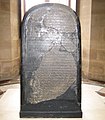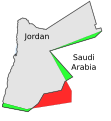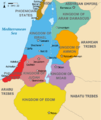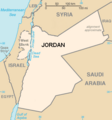Portal:Jordan
The Jordan Portal  Jordan, officially the Hashemite Kingdom of Jordan, is a country in the Southern Levant region of West Asia. Jordan is bordered by Syria to the north, Iraq to the east, Saudi Arabia to the south, and the occupied Palestinian territory of the West Bank and Israel to the west. The Jordan River, flowing into the Dead Sea, is located along the country's western border. Jordan has a small coastline along the Red Sea in its southwest, separated by the Gulf of Aqaba from Egypt. Amman is Jordan's capital and largest city, as well as the most populous city in the Levant. Modern-day Jordan has been inhabited by humans since the Paleolithic period. Three kingdoms emerged in Transjordan at the end of the Bronze Age: Ammon, Moab and Edom. In the third century BC, the Arab Nabataeans established their Kingdom centered in Petra. Later rulers of the Transjordan region include the Assyrian, Babylonian, Roman, Byzantine, Rashidun, Umayyad, Abbasid, and the Ottoman empires. After the Great Arab Revolt against the Ottomans in 1916 during World War I, the Greater Syria region was partitioned by Britain and France. The Emirate of Transjordan was established in 1921 by the Hashemite, then Emir, Abdullah I, and the emirate became a British protectorate. In 1946, Jordan gained independence and became officially known as the Hashemite Kingdom of Jordan. The country captured and annexed the West Bank during the 1948 Arab–Israeli War until it was occupied by Israel in 1967. Jordan renounced its claim to the territory to the Palestinians in 1988, and signed a peace treaty with Israel in 1994. Jordan is a semi-arid country, covering an area of 89,342 km2 (34,495 sq mi), with a population of 11.5 million, making it the eleventh-most populous Arab country. The dominant majority, or around 95% of the country's population, is Sunni Muslim, with the rest being mostly Arab Christian. Jordan was mostly unscathed by the violence that swept the region following the Arab Spring in 2010. From as early as 1948, Jordan has accepted refugees from multiple neighbouring countries in conflict. An estimated 2.1 million Palestinian (most of whom hold Jordanian citizenship) and 1.4 million Syrian refugees were present in Jordan in 2015. The kingdom is also a refuge for thousands of Christian Iraqis fleeing persecution. While Jordan continues to accept refugees, the large Syrian influx during the 2010s has placed substantial strain on national resources and infrastructure. The sovereign state is a constitutional monarchy, but the king holds wide executive and legislative powers. Jordan is a founding member of the Arab League and the Organisation of Islamic Co-operation. The country has a high Human Development Index, ranking 102nd, and is considered a lower middle income economy. The Jordanian economy, one of the smallest economies in the region, is attractive to foreign investors based upon a skilled workforce. The country is a major tourist destination, also attracting medical tourism due to its well developed health sector. Nonetheless, a lack of natural resources, large flow of refugees, and regional turmoil have hampered economic growth. (Full article...) Selected article -Lesbian, gay, bisexual, and transgender (LGBT) individuals in Jordan face legal challenges and discrimination not experienced by non-LGBT persons. However, Jordan remains one of few Arab countries where homosexual conduct is not criminalized. Same-sex sexual activity was illegal in Jordan under the British Mandate Criminal Code Ordinance (No. 74 of 1936) until 1951 when Jordan drafted its own penal code which did not criminalise homosexuality, after having gained independence in 1946. Homosexual conduct is legal in Jordan. But LGBT people, like their Heterosexual counterparts, displaying public affection can be prosecuted for "disrupting public morality" and most LGBT people face social discrimination not experienced by non-LGBT residents. (Full article...)Selected biography -The Hashemites (Arabic: الهاشميون, romanized: al-Hāshimiyyūn), also House of Hashim, are the royal family of Jordan, which they have ruled since 1921, and were the royal family of the kingdoms of Hejaz (1916–1925), Syria (1920), and Iraq (1921–1958). The family had ruled the city of Mecca continuously from the 10th century, frequently as vassals of outside powers, and ruled the thrones of the Hejaz, Syria, Iraq, and Jordan following their World War I alliance with the British Empire. The family belongs to the Dhawu Awn, one of the branches of the Ḥasanid Sharifs of Mecca, also referred to as Hashemites. Their eponymous ancestor is traditionally considered to be Hashim ibn Abd Manaf, great-grandfather of the Islamic prophet Muhammad. The Ḥasanid Sharifs of Mecca (from whom the Hashemite royal family is directly descended), including the Hashemites' ancestor Qatadah ibn Idris, were Zaydī Shīʿas until the late Mamluk or early Ottoman period, when they became followers of the Shāfiʿī school of Sunnī Islam. (Full article...)WikiProjectFor editor resources and to collaborate with other editors on improving Wikipedia's Jordan-related articles, see WikiProject Jordan. General images -The following are images from various Jordan-related articles on Wikipedia.
Selected city -
See also: List of cities in Jordan
Related portalsReligions in Jordan Arab states Other countries Recognized content
Featured articlesGood articles
TopicsSelected topic overview -
CategoriesSelected picture -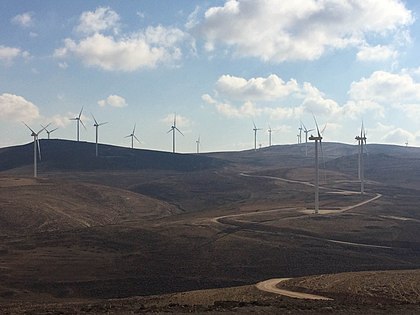 The Tafila Wind Farm in southern Jordan is the first and largest onshore wind farm in the Middle East.
Associated WikimediaThe following Wikimedia Foundation sister projects provide more on this subject:
SourcesDiscover Wikipedia using portals |

